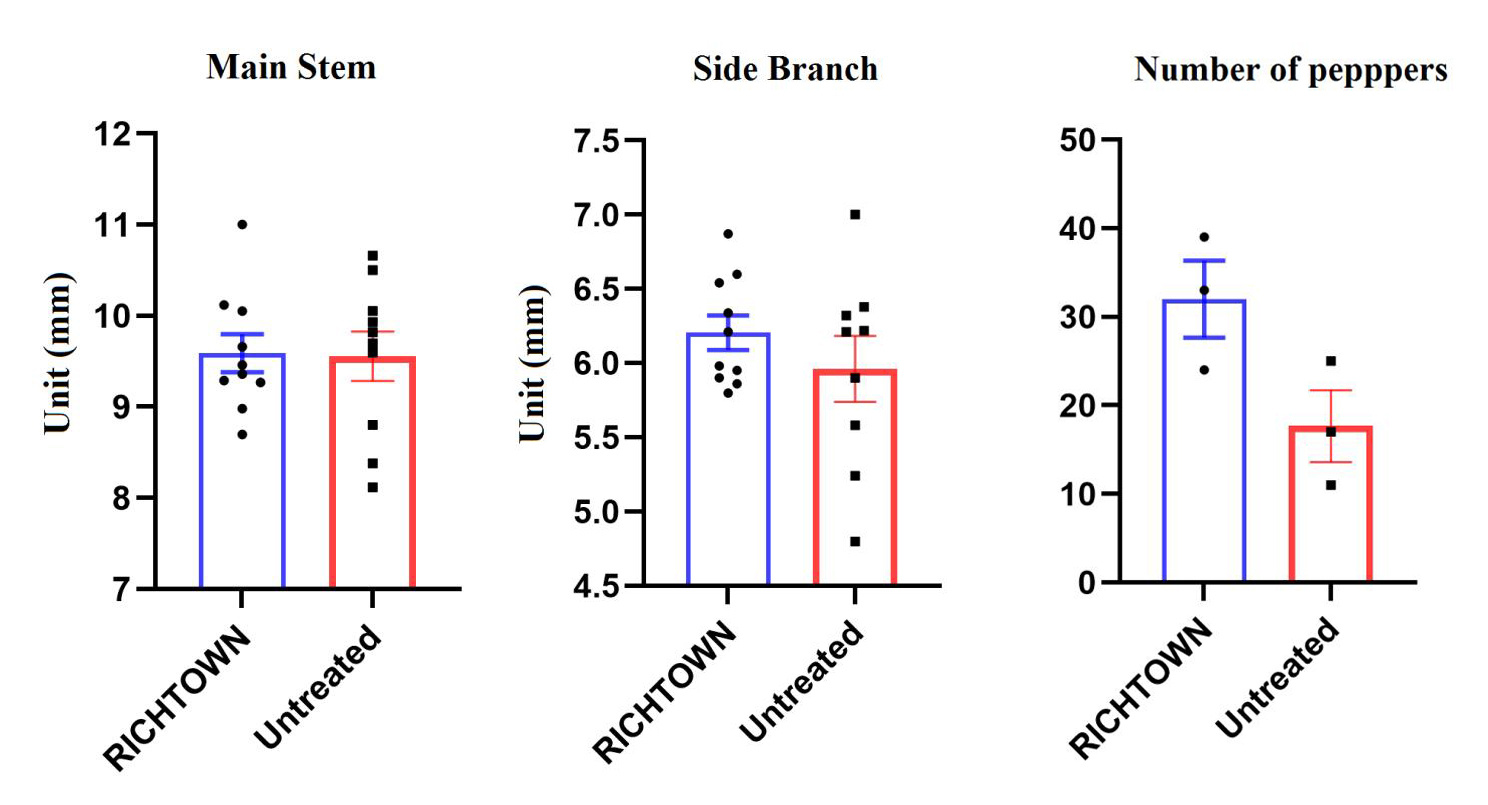Case Studies
We provide plant protection and plant nutrition products that help build healthy and sustainable food systems.
Introduction to RICHTOWN
Fungicide
Watermelon Anthracnose
Watermelon anthracnose occurs in most of the watermelon-producing areas in the world, among which it is most obvious and common in areas with humid climate. When the climatic conditions are suitable, the disease can occur at all stages of plant growth from the seedling stage of the plant, especially in the middle and late stages, causing fruit rot and leaf withering. The incidence of watermelon anthracnose is 10-20%, and the production reduction can reach 10-15%. In severe cases, the incidence rate can reach100%, and the yield loss exceeds 40%.
Rice Blast
Rice blast is a common disease of rice that can lead to a substantial reduction in yield. In severe cases, the production can be reduced by 40% to 50%, or even no grains can be harvested. It occurs in all rice-producing regions of the world, and can cause different degrees of yield reduction after occurrence. It mainly damages leaves, stems and ears. According to the time and part of the rice blast damage, it can be divided into seedling blast, leaf blast, knot blast, panicle blast, and grain blast.
Peanut Leaf Spot
Peanut leaf spot is divided into black leaf spot and brown leaf spot, which are caused by Cercospora globus and Cercospora arachis respectively. The leaf spots mainly occur on the front and back sides of the leaves, round or near round shaped, with a size of 0.5 mm to 8.0 mm. After the lesion expands, it merges into large irregular plaques. When the petioles, stems and flower rachis are infected, the lesions are linear or oval, dark brown, and sometimes with light yellow water-soaked halos on the periphery. It mainly damages leaves, reduces photosynthesis efficiency, causes early defoliation, and affects nutrient accumulation. Affected by this disease, the yield can generally be reduced by 5%-15%, and it can reach more than 30% in severe cases.
Sunjoy recommendations
Sunjoy Agro recommends Richtown (Difenoconazole 125g/L + Azoxystrobin 200g/L SC), a broad spectrum fungicide for control of important diseases caused by the Oomycete, Ascomycota, Basidiomycetes, and Deuteromycota. It provides reliable control against anthracnose of watermelon, leaf spot of peanut, blast of rice, powdery mildew of grapes, etc.
The two active ingredients have outstanding protection and treatment effect. Difenoconazole, a triazole fungicide, prevents fungal growth by inhibiting the biosynthesis of sterols in cell membranes. It can be distributed evenly on leaves due to its strong fat-soluble property and has a good effect on pathogens with less penetrating power, such as leaf spot fungi. Azoxystrobin, a strobilurin fungicide, inhibits mitochondrial respiration by blocking electron transport. Azoxystrobin has a broad control spectrum, especially for pathogens with strong penetrating power like rust. Because of its strong water-soluble properties, after being absorbed by the root, it can be transmitted to the stem through the xylem, so as to control disease from roots to shoots. As a result, Richtown offers unprecedented protection against key diseases across a wide variety of crops. In addition, Richtown can improve the appearance quality and plant resistance to environmental stress.
|
Crop |
Disease |
State |
Application rate |
|
Citrus |
Anthracnose, brown spot, scab, citrus melanose |
Spring shoots sprout 3-5 cm, 2/3 flowers lost, autumn slightly germinate 3-5 cm |
Foliar spray: 6-7.5 ml per 15 litres of water depending on severity of the disease |
|
Rice |
Rice blast, rice curl, sheath blight |
At the end of tillering, 5-7 days before breaking, after full head |
Foliar spray: 450-750 ml per hectare depending on severity of the disease |
|
Peanut |
Leaf spot, scab |
Before flowering, fruit needle stage, 20 days before harvest (fruit rising stage) |
Foliar spray: 300-450 ml per hectare depending on severity of the disease |
|
Vegetables |
Anthracnose, powdery mildew, leaf spot |
Whole growth stage |
Foliar spray: 15-20 ml per 15 litres of water depending on severity of the disease. |
Pay attention to the following points before using this product:
- Richtown is phytotoxic to certain apple varieties. Do not spray Richtown on apple trees directly or through drift.
- Use with caution on crop seedlings and pears.
- Do not use Richtown in combination with silicon-based and oil-containing surfactants on vegetables and citrus.
- For situations where spray or tank-mixing is not strictly prohibited, test on a small portion of the crop first to ensure application safety.
Application Scenario
Sunjoy Agro conducted hundreds of trials on rice, fruit trees, and vegetables to test the effectiveness of Richtown. For example, we conducted an experiment on peppers in Fuzhou City, Fujian Province. The researchers used A (Difenoconazole 125g/L + Azoxystrobin 200g/L SC with 2.25L/ha) and B (Untreated) for root irrigation at the early flowering stage in 3 replicates. 10 pepper plants with similar growth condition were selected for each replicate. A total of 30 pepper plants were examined for each treatment. The growth and number of pepper were investigated 14 days after treatment. Pepper growth was compared by measuring the diameter of the main stem (3cm below the first branch) and the side branch (the fourth branch).
The trial period was from 10/13/2021 to 10/27/2021. Researchers applied the fungicide on 10/13 and recorded the results on 10/27. The Richtown-treated pepper had better growth, greener leaves, and more fruit numbers than the untreated peppers. According to the data of this experiment, there was no significant difference in the main stem, but there was a certain difference in the diameter of the side branch. The number of peppers in the Richtown treatment group was significantly higher than that in the untreated group.
In conclusion, the application of Richtown root irrigation at the flowering stage not only promotes the vegetative growth of peppers, but also increases the crop yield.

Explore More

